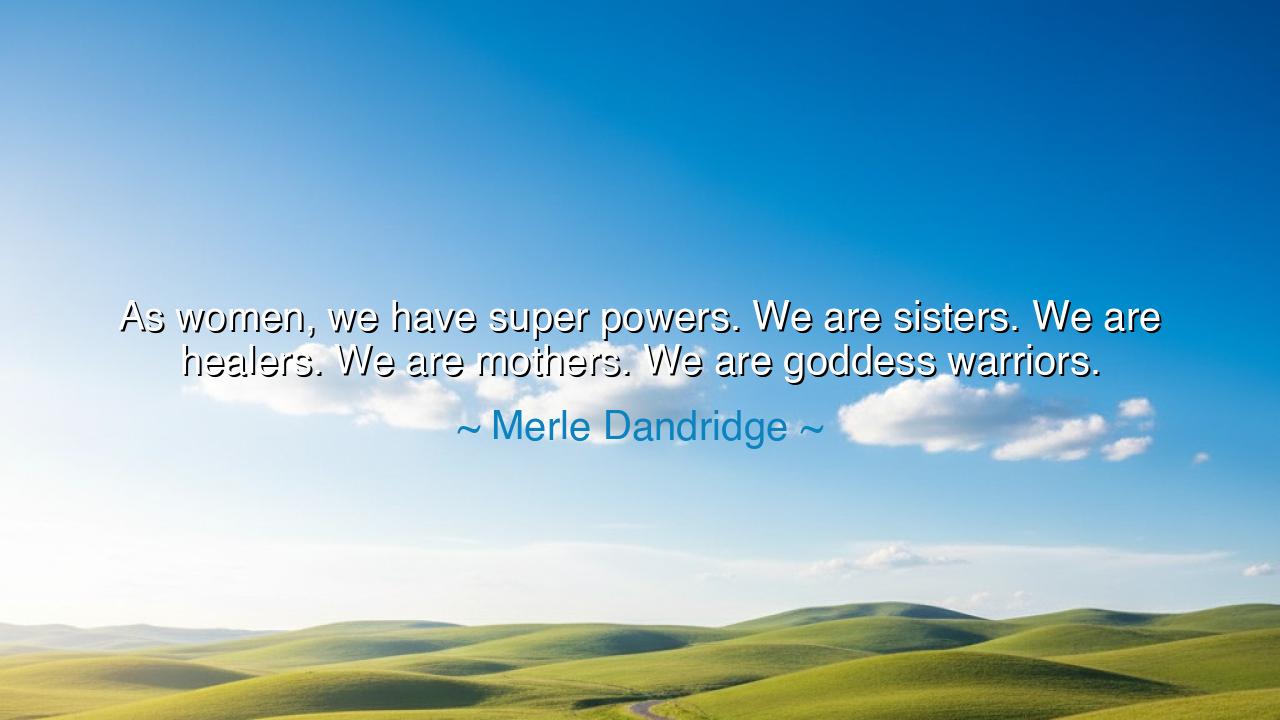
As women, we have super powers. We are sisters. We are healers.
As women, we have super powers. We are sisters. We are healers. We are mothers. We are goddess warriors.






Merle Dandridge, artist of stage and voice of strength, once declared: “As women, we have super powers. We are sisters. We are healers. We are mothers. We are goddess warriors.” In this utterance she unveils the sacred fullness of womanhood, not as weakness nor as ornament, but as a force vast and elemental. Her words proclaim that women are not fragments of society, but its foundation, carrying within them powers of creation, compassion, and resilience that no empire can erase.
The origin of this saying lies in Dandridge’s own life and career, as she stood as a figure of representation in the world of theater, television, and voice acting. Rising in industries long dominated by others, she saw that women—especially women of color—had to claim their identities as powers, not burdens. By naming women as sisters, healers, mothers, and goddess warriors, she called forth the archetypes that have endured through myth and history, urging her sisters to remember that strength flows not from imitation of men, but from embracing their own ancient roles.
History itself bears witness to this truth. In ancient times, the women of Sparta were not silenced, but raised with strength. They told their sons before battle: “Return with your shield, or upon it.” These mothers were not passive figures but guardians of valor, shaping warriors with words as fierce as steel. Here we see the super power of motherhood, not merely to nurture but to forge courage that lasts beyond death.
So too in the modern era, the sisters of the Civil Rights Movement—women like Fannie Lou Hamer, Ella Baker, and Rosa Parks—stood as healers of a wounded nation. Though often overshadowed, they prayed together, worked together, and carried burdens together. They were the “goddess warriors” Dandridge named, fighting not with weapons of war but with the endurance of spirit and the refusal to bow to injustice. Their sisterhood was a shield; their healing was a revolution.
Therefore, O children of tomorrow, remember Dandridge’s words. To be a woman is to hold within oneself powers unseen yet unstoppable: the power to create life, to bind communities, to heal wounds, and to fight with wisdom and fire. Women are sisters, mothers, healers, and warriors—not by fragments, but by wholeness. And when these powers are claimed together, no chain of patriarchy, no empire of oppression, can withstand their force.






TTho thi thanh thuyen
Dandridge’s words are a bold celebration of the many roles women play in society, and I find it inspiring. However, I wonder—does the idea of women as ‘superheroes’ place too much pressure on women to constantly be strong and selfless? While we absolutely should acknowledge and celebrate these ‘superpowers,’ how can we ensure that women also have the space to be themselves without the weight of unrealistic expectations of constant strength?
MNMinh Nguyen
This quote evokes such a sense of power and unity. It’s a reminder of how interconnected women are as a collective force—whether as sisters, mothers, or warriors. But is it possible that by viewing women as ‘goddess warriors,’ we set an expectation of perfection or strength that overlooks vulnerability and self-care? How do we ensure that women can embrace their power while also allowing themselves the grace to be human and imperfect?
GDGold D.dragon
I love how Dandridge frames women as not just nurturers but as warriors, healers, and goddesses. These are all qualities that challenge the traditional, limiting views of what it means to be a woman. But what happens when society fails to acknowledge these superpowers? How do we reclaim these identities, especially in environments that undervalue or overlook the multi-dimensionality of women? What steps can we take to honor these roles both personally and socially?
TTNguyen Tan Tai
Merle Dandridge’s words are powerful and empowering. The idea that women possess ‘superpowers’ speaks to the strength and resilience that women exhibit daily, whether as nurturers, leaders, or warriors. But what does this mean in a world where women are still fighting for equal rights and recognition? How can we collectively amplify the strength that is already within us to challenge societal norms and create more inclusive spaces for women to thrive?